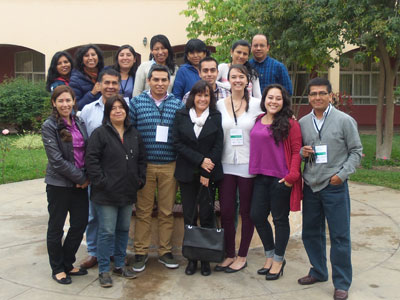Alliance Promotes Health, Gender Imperatives for Clean Cooking at International Forums
UGANDA
Workshop on Clean Cooking and Public Health Held in Uganda
A diverse group of over fifty people, including public health researchers and implementers, clean cooking entrepreneurs, members of civil society and nongovernmental organizations, local and national government representatives, and representatives from development agencies attended a workshop on ‘Clean Cooking and Public Health’ in Kampala, Uganda in late August.
The event was intended to create active partnerships between the clean cooking and public health implementation communities and was sponsored by the Global Alliance for Clean Cookstoves (Alliance), the FRESH Air Uganda Collaboration (FRESH Air), and the Ugandan National Alliance on Clean Cooking (UNACC). The workshop highlighted recent research and public health efforts in Uganda’s Masindi district, as well as the momentum within the country to scale up clean cooking.
This important first step to facilitate conversations between the public health and clean cooking implementer communities helped lay the groundwork for pragmatic and strategic partnerships to raise awareness and promote the scale up of a range of clean cooking technologies. The high volume of participation by multiple stakeholders reflects the appetite for a more focused approach to fostering active partnerships in order to 1) raise awareness about the public health benefits of scaling up clean cooking, and 2) facilitate the adoption of clean cooking.
Financial support for this meeting was provided by the Netherlands Enterprise Agency and the Alliance.
A more detailed meeting report, along with presentation materials, is available at left under Related Information.
SWITZERLAND & BRAZIL
Alliance Shares Progress on Measuring Adoption and Health Benefits of Clean Cooking at Key International Forums
As the sector awaits final results of three child survival studies demonstrating the benefits to children’s health through the adoption of clean cooking, researchers have been vetting interim findings with their public health research colleagues at key international technical conferences.
At the 9th European Congress on Tropical Medicine and International Health Conference, an annual convening of nearly 2,000 researchers and experts in the fields of tropical medicine and international health, the Alliance hosted a panel featuring scientists from Ghana and Peru, as well as a WHO representative who spoke about about adoption and the health benefits of clean cooking. They presented the latest issues and challenges with regard to clean fuel technology, choice of devices, uptake and adoption of clean cookstoves and fuels, and measuring and achieving impact at scale.
This event offered an exciting new platform for the Alliance to interlink with other scientists in the fields of tropical medicine and international health while emphasizing the importance of clean cooking interventions as a means to ensuring public health benefits.
At the 27th annual meeting of the International Society of Environmental Epidemiology (ISEE), interim results from two Alliance-funded child survival studies in Ghana and Nigeria were presented. Researchers made presentations highlighting the impact of household air pollution on blood pressure and the ability of demonstrably clean cooking technologies to reduce exposures to household air pollution, even in polluted urban centers. Further, results from the Nigeria study demonstrate that when given the option to cook with ethanol, a clean burning fuel, almost all of the women were willing to give up their kerosene stoves. These interim findings have major implications for Alliance programs to implement clean cookstoves and fuels adoption in urban centers.
The final results from the Alliance-funded studies in Ghana, Nigeria, and Nepal are expected to be released in late 2015 and early 2016.
PERU
Empowered Entrepreneur Training of Trainers: Capacity Building for Cookstove Programs in Peru and Bolivia
Peruvian and Bolivian development organizations convened in Lima in August for a training-of-trainers to practice and develop strategies for implementing the Alliance’s Empowered Entrepreneur Training Handbook, which provides training in business, empowerment, and leadership skills for women energy entrepreneurs.*

The group of participants, which included 5 men, was trained on how to implement the Handbook’s curriculum, which aims to train women entrepreneurs. A combination of facilitated lectures, group discussions, and personal application of the curriculum through activities, enhanced participants’ understanding of empowerment and leadership concepts and showed how they can complement and add value to training on traditional business skills.
Participants created their own “Human-Centered Design Plans” to think critically about the challenges they might face when working with entrepreneurs, choose which training activities are most relevant, identify culturally-appropriate case studies and examples, and develop a plan of action for each organization to implement the training material.
[pullquote]Genevieve Smith, a lead author of the Handbook, designed and led the 5-day workshop with support from Paola Saldivias Mendez and Paul Spurzem, experts in cookstove implementation and empowerment, respectively. Mendez has previously implemented the training with Bolivian women community leaders and recently led a training-of-trainers in Guatemala. Spurzem, as the only male facilitator, offered a different perspective, helping to apply a gender lens in activities where participants roleplay product marketing and sales. The dynamic facilitation team encouraged the classroom to constructively challenge gender norms, giving participants an added layer of gendered insights. Though the Handbook targets women entrepreneurs, men can benefit equally from each lesson when appropriate adjustments are made by training facilitators.
When asked what empowerment means to her, training participant Tania Flores Lopez of Soluciones Practicas said, “Empowerment means [to be] capable of creating and acting on decisions that affect your life.”
[*] Translations of the Handbook and supporting materials are available in Spanish and French.
